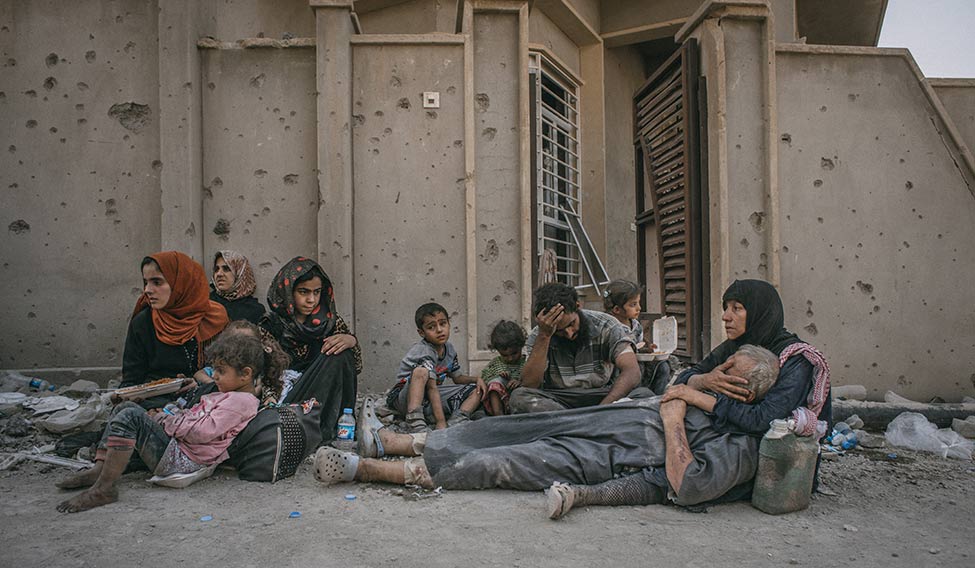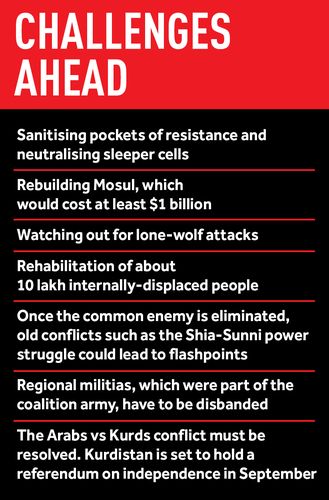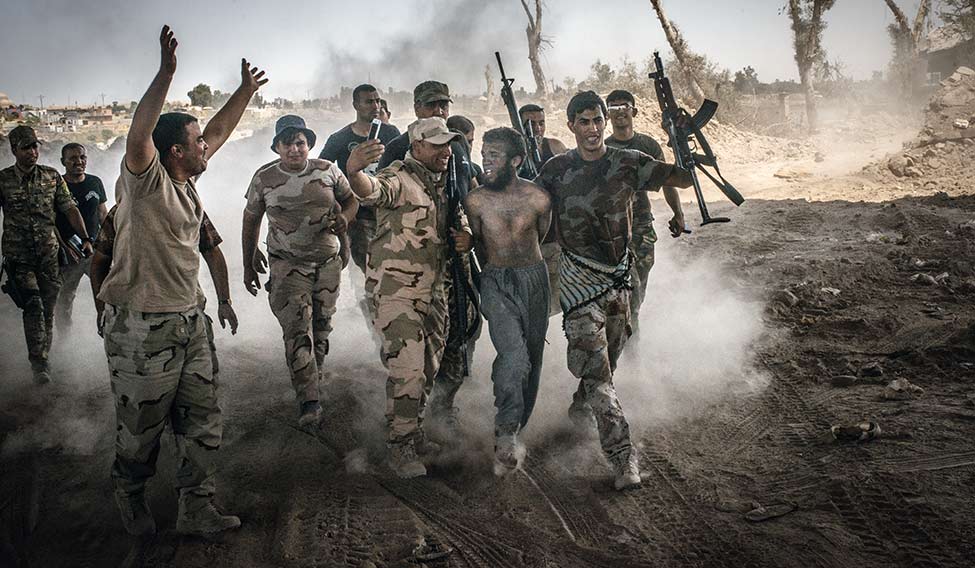The blank stares of the women and children on the streets of Mosul will haunt me forever. They pierce right through me, conveying a barrage of emotions: fear, frustration, trauma, hopelessness....
I was back home in Milan when the US-backed coalition forces made the final push to recapture Mosul from the Islamic State. I was on a ten-day break to stabilise, return to normalcy. Because while covering the war, I am always suspended in the middle of action, unable to fathom what is happening around me. Suspended in a world of whizzing bullets, deafening blasts and mind-numbing wails. It leaves one in a daze.
Moving with the Iraqi army along the frontline, all I focus is on getting shots that can communicate the layers of war to the people, and not getting shot at. Thanks to the Iraqi soldiers, who were like family, I never got seriously injured.
Bullets. Bombs. Blood. Snipers. Pain. Devastation. Heat. Starvation. Tears. It has been a surreal, hellish experience. There were days I wished all these ended ‘today’, ‘now’.
Even as I was gorging on pizzas, pasta and ice cream in Milan, I recalled sharing rice and beans (occasionally, there would be potatoes) with the Iraqi soldiers. I used to feel bad for them. They kept fighting with no proper food and insufficient water.
And, even as I guzzled cold country white wine that my father bought for me, I was reminded about the precious sips of water we had in Mosul. There were times when I had to go without a wash for a week, despite temperatures over 40 degrees Celsius. I learnt how precious water was the hard way.
I bathed in the sea and spent time with my girlfriend. But, the blank stares—especially of women carrying babies—kept popping in my mind. I cut short my break and rushed back to Mosul, where Prime Minister Haider al-Abdadi declared “total victory” over Islamic State on July 9.
 Homeless, hopeless: The collateral damage in the war for Mosul has been huge. Reports say more than 5,000 civilians have been killed.
Homeless, hopeless: The collateral damage in the war for Mosul has been huge. Reports say more than 5,000 civilians have been killed.
During the mission—my sixth trip to Mosul—I was embedded with 73 Brigade of the Iraqi army (two other journalists and I paid a ‘fixer’ $450 to get in). The brigade was led by Major Tareq, who took great care of my safety.
One day, as the troops were sanitising a street, a frail, old woman came out of a house on a wheelchair. The recce team warned that it was IS territory, and a rescue mission could be fatal. IS snipers were all around us.
That was when I came across a soldier named Abbas, who later became a great friend of mine. On an impulse, he dashed towards the house and carried the old woman on his shoulders to the safety of our post. It was a scene of valour that you see in films. ‘Stupid bravery,’ I thought.
Later, as the area was secured, we found that all that was left in the woman’s house were dry crumbs of bread and a few sips of water. There was no electricity, no ceiling fan.
Abbas is no more; I will never forget him. I was with him when he was killed. A team of 12 solders and I were moving into a vacant building. Another team of Iraqi soldiers mistook us for IS fighters, and a tank fired at us. Abbas lay dead a few feet away from me.
Once, during a patrolling drive, we spotted a stranded couple crying for help. Major Tareq was helpless, as IS snipers would finish us all off if we attempted to rescue them. He was particularly worried about my safety, as an Iraqi and two French journalists had been killed in a mine blast just a few days ago.

As the sun set, Tareq ordered a tank to head towards that family, which included babies. As he boarded the tank, he ordered me to back off. “Too dangerous,” he shouted. My anxiety ended when he returned with that family, safe inside the tank. It was a moment of relief.
There were moments of despair, too. I believe humanitarian aid is grossly insufficient. The UN has to do more. I will never forget the Iraqi police baton-charging its own people mobbing for food and water.
Also, there has been a sense of hurry to end the war. And the collateral damage has been huge. Imagine the plight of civilians trapped in the besieged buildings: you try fleeing, and IS snipers would shoot; you stay inside, and you are likely to be killed in an air raid.
There was heavy strafing of west Mosul, especially towards the end of the war. There have been instances of hundreds of civilians getting killed in bombings targeting, say, just two snipers. International watchdogs have termed the war—which witnessed the most intense urban combat since World War II—as a “civilian catastrophe”. However, the officers celebrating the ‘victory’ say “extraordinary measures” were taken to ensure safety of civilians.
Groups such as Amnesty International have accused Iraqi soldiers of “breaking conventions of war”. They allege the soldiers have been wantonly killing IS fighters and suspects, instead of taking them prisoners.
I once saw two soldiers with two suspects turning a corner, and then I heard gunshots. Only the soldiers returned. One of them nodded to me to probably convey that they eliminated the suspects.
At all check-posts, only women and children are being allowed to pass through. The men are taken to “detention centres” for “interrogation”. But everyone on the ground is certain that none of them would come out alive. The soldiers do not want to give anyone even the benefit of doubt.
I recall Tareq telling me, “The justice system in Iraq is very corrupt. With a good lawyer, anybody can manage to get out of jail.” The soldiers want to take no chance, so even suspects are shot dead.
Many realities of wars never come out. And now, there is an unofficial ban on journalists moving with troops. The Iraqis, obviously, do not want the dark truths to be revealed.
For me, only one truth matters. Back in my base in Istanbul, that truth disturbs me. Yes, the truth that the blank stares would follow me for a long, long time.






